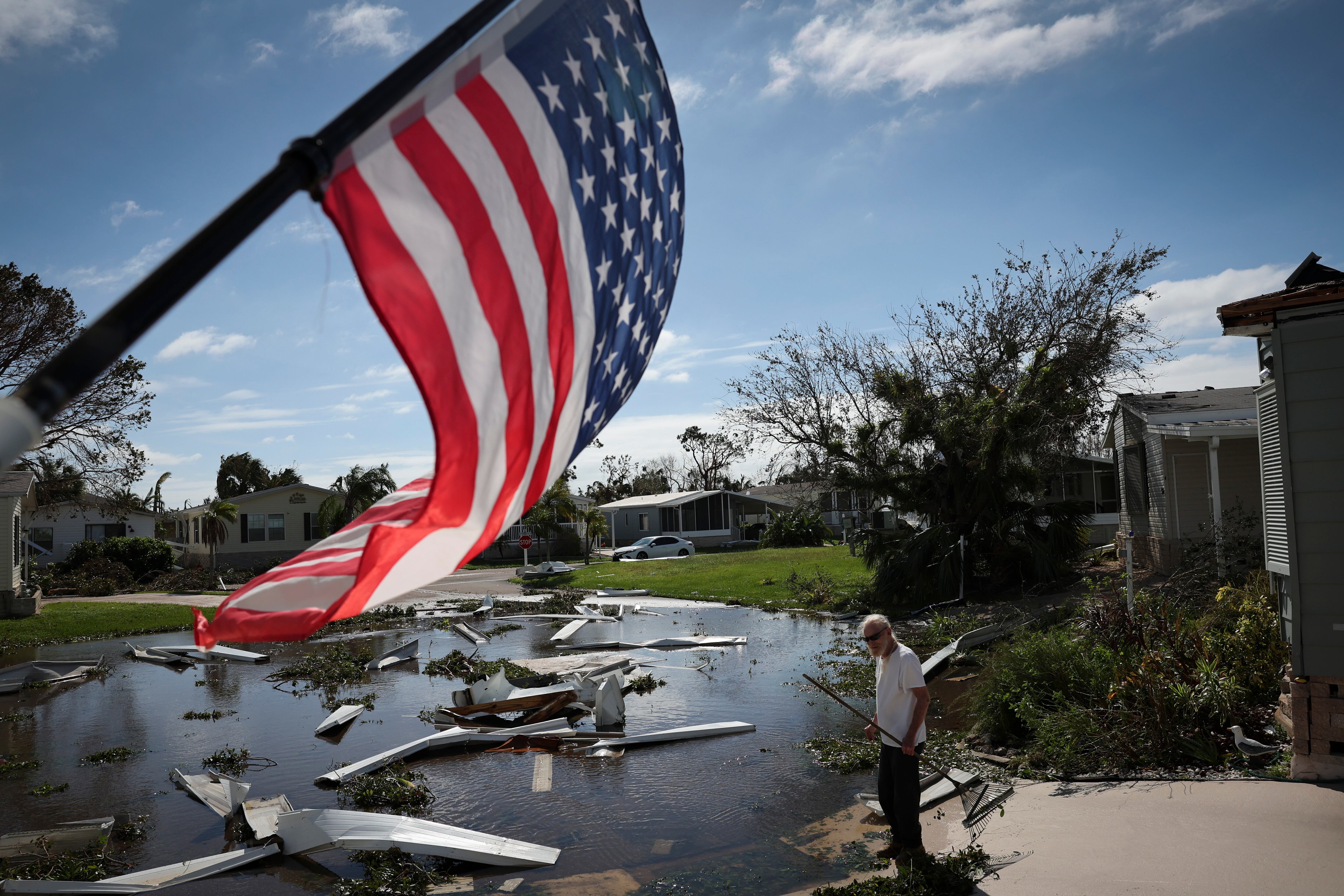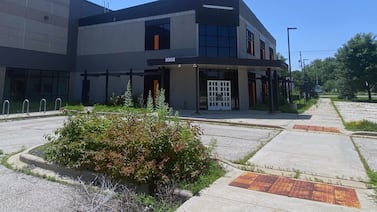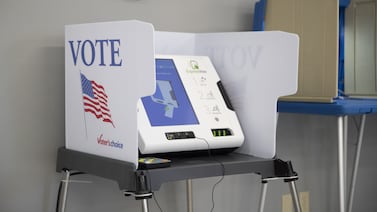A version of this post was originally distributed in Votebeat’s weekly newsletter. Sign up here.
Hurricane Ian could rank as the most destructive storm to ever hit Florida, a historic catastrophe with staggering implications for residents’ lives and property.
The toll is still accumulating and likely will be for weeks. It’s too soon to expect anyone to think much past the immediate repercussions and dangers of the storm.
Nonetheless, the November election looms. The hurricane’s impact will certainly extend to that, too. Local and state election officials must quickly make decisions that could reshape access to the ballot — and there are real implications for voters.
Sites normally used to host voting could be damaged, inaccessible, or even destroyed. Residents displaced by the storm may not have an easy way to receive their mail ballot or report to a polling place.
Four years ago, Hurricane Michael hit Florida 27 days before the 2018 midterm elections. Then-Gov. Rick Scott issued an executive order loosening some requirements on mail ballots and extending early voting, but also allowing election officials dealing with devastation to consolidate polling places.
That consolidation, not the storm, depressed turnout in the eight counties covered by the executive order, according to new research from the nonpartisan Brennan Center for Justice at NYU Law.
Kevin Morris, a researcher for the Brennan Center, said turnout in the affected counties was down about 7 percentage points, most of which he attributed to the polling place consolidation: For every additional mile a voter had to travel between their planned polling place and their post-storm polling place, their turnout dropped about 1 percentage point.
The executive order’s provisions easing access to mail and early voting were helpful, but didn’t offset the drop, he said.
“The big takeaway is that the state should do its best to provide emergency funding to [local election officials] to keep as many polling places open as possible,” he said. Morris acknowledged some polling places are likely to be unusable. After Hurricane Sandy, he said, New Jersey officials brought in tractor trailers and took other steps to let people vote in parking lots, to avoid moving locations.
Local election officials are already reckoning with the massive disruption in the critical period leading up to the election. The website Florida Politics reported that election offices in Hillsborough, Sarasota and Collier counties, among others, have had to close down for multi-day stretches.
The site also reported that county election officials must send vote-by-mail ballots out between 30 and 33 days before an election, a window that started Thursday. The state’s association of election supervisors has asked state officials if they will be providing flexibility to counties impacted by the hurricane. Mark Earley, the president of the supervisors association, said some counties may need additional time, although that’s still being assessed.
The secretary of state’s office didn’t respond to a request for comment about whether it plans to do so, or whether it will provide additional resources to election officials in affected areas.
Academic researchers long ago showed that changing polling places has consequences. Increased distance matters, but any change forces voters to adjust to change and search for a new location, potentially depressing turnout.
Florida isn’t the only place where disasters have forced the issue. But right now, officials there have the opportunity to use lessons from the past to better accommodate voting amid an emergency.
Back Then
This is, as noted above, far from the only time hurricanes have messed things up for election season. For a lighter example, go back to 1992 in this fascinating little time capsule from the New York Times, offering a striking visual of Vice President Dan Quayle continuing his campaign in Central Florida despite a hurricane. His remarks at a local church were interrupted by an AIDS protester. Central Florida, where, the Times writes, “‘Reagan Democrats’ are thick as the citrus groves,” had a majority of registered Democrats but went hard for Republican presidential candidates George H.W. Bush (Quayle’s boss) in 1988 and Ronald Reagan in 1984 and 1980. “Bush’s campaign strategists consider Florida’s 25 electoral college votes crucial to winning re-election,” wrote the Times. Ultimately, Bush won Florida that year in an absolute squeaker, but still lost the election to Clinton.
New From Votebeat
Two of Donald Trump’s most prominent allies in his fight to overturn the 2020 election, Michael Flynn and Patrick Byrne, are leading a coordinated, multi-state effort to probe hundreds of local election officials in battlegrounds such as Michigan, Arizona, and Texas ahead of the November election, Jen Fifield reports for Votebeat. The questions reflect the same debunked conspiracies and misleading information about elections that Flynn and Byrne have been propagating for years.
In Other Voting News
- Texas Attorney General Ken Paxton cannot unilaterally prosecute election cases without permission from local prosecutors, the state’s highest criminal court reaffirmed this week. Paxton had asked the Court of Criminal Appeals to reconsider an earlier decision striking down a law that had previously permitted him to do so, the Texas Tribune reports, but the court stood by its earlier opinion. Paxton is now asking the state Legislature to step in.
- Philadelphia will offer ballots and voting materials in triple the number of languages it currently supports. In addition to English, Spanish, and Chinese, it will add Russian, Vietnamese, Khmer, Arabic, Haitian Creole, and Portuguese, the Philadelphia Inquirer reports.
- A federal judge has blocked two parts of a new Arizona law dealing with voter registration from taking effect, the Arizona Republic reports. One of the blocked sections would have made it a felony for anyone to knowingly provide a “mechanism for voting” to someone who is registered to vote in another state, including forwarding an early ballot. The other provision would have required county officials to cancel a voter’s registration if they confirm the voter is registered in another county, with no requirement to notify the voter. It’s common for voters who move to not necessarily cancel their registration at their prior residence. The state attorney general is appealing the injunction.
- Michigan lawmakers and the governor agreed on a deal that would give local election officials two days to pre-process absentee ballots, Bridge Michigan reports. Clerks have been requesting the ability for years, hoping to speed up election results.
- A new California law will allow election workers to shield their address from public records via a program initially created for domestic violence survivors, reports the Monterey Herald, a change meant to ensure the safety of election officials contending with threats.
- A new paper by election researchers at Harvard finds that mail ballots in 2020 were rejected at a lower rate than in 2018 in most states, despite the surge in voters who cast ballots by mail for the first time that year. States with adjusted vote-by-mail policies like ballot curing, drop boxes, and ballot tracking saw some of the lowest rejection rates.
Carrie Levine is Votebeat’s story editor and is based in Washington, D.C. Contact Carrie at clevine@votebeat.org.






